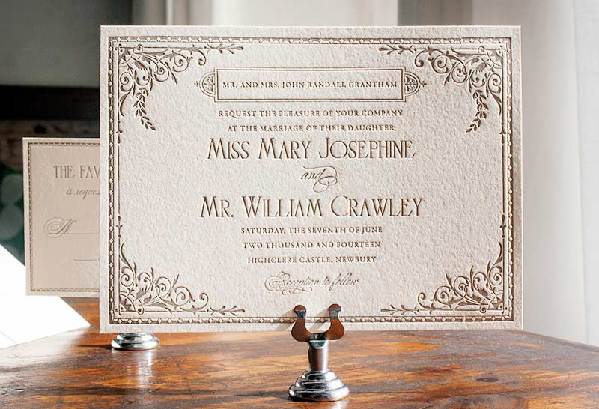当前位置: Language Tips> 双语新闻
Talking proper: the language of U and Non-U
The following guide summarizes advice on how to mix with the posh set at a formal meal.
想要在正式的宴会上完美融入上流社会?不妨看看下面的指南,概括了不少实用建议哦。
Invitations
邀请别人赴宴

The invitation should be written on writing-paper rather than note-paper. should be written on writing-paper rather than note-paper.
邀请不能用笔记本的纸写,而要写在信纸上。
Address male guests by their surname alone, unless they are a government minister, when Sir is required, or the king, when it should be Sire.
只写男宾的姓氏,除非他是政府大臣(这时需要加上Sir),或国王(需要加上Sire)。
When giving your address, avoid non-U house names like Fairmeads; U speakers stick to formal titles like Shinwell Hall. I can think of a potential problem here for people who don’t live in a manor house, but I presume that not living in a manor house is also non-U.
提及自己的住址时,别像非上流社会的人那样管自己的房子叫Fairmeads之类的名字。上流社会总是使用正式名称,例如Shinwell Hall。我能想象这里可能会有一个问题,有些人并不住在庄园里。但我觉得住不起庄园也算不上上流社会的人。
The next difficulty is determining the correct term for the meal itself to which the guests are invited. Is dinner taken at midday or in the evening? What about lunch and supper – are these acceptable terms, or will they immediately flag your lowly status? Properly speaking, one should have lunch (or even luncheon) in the middle of the day and dinner in the evening. To refer to lunch as dinner, or to use the term evening meal is to betray your non-U origins. If a dinner guest praises the supper, then the implication is that the meal was insubstantial and unsatisfying.
下一个难点是如何正确描述要请宾客吃哪顿饭。Dinner这个词究竟是说午饭还是晚餐?可以使用lunch和supper吗?它们会不会立刻显得你没那么高大上?正确的说法是,午餐应该叫lunch甚至luncheon,晚餐则叫dinner。管午餐叫dinner或是管晚餐叫evening meal都会暴露你非上流社会的出身。要是一位客人说今晚的supper真不错,那他不是在暗示晚餐不够丰盛,就是说它不够美味。
Never issue an invitation to high-tea, as this is an exclusively non-U invention.
绝对不要邀请别人参加high-tea,只有非上流社会的人才会使用这个词。
When stating the dress code, be sure not to use the terms dress-suit or evening-dress. The refined equivalent is to state simply: "We will be changing for dinner". How your guest is supposed to glean what to wear from this is a mystery to me, but I suppose that is precisely the point. If you have to ask, you shouldn’t be going.
提到着装规定时,一定不要用dress-suit或evening-dress,而是简单的说 “We will be changing for dinner”就可以了。对我来说,客人们如何领会该穿什么其实是个谜,但这正是关键所在。如果不知道穿什么,你就不应该去。
上一篇 : 偷吸烟遭谷歌街景图“出卖”
下一篇 : 日本稻田里种出“贱熊泰迪”
电话:8610-84883645
传真:8610-84883500
Email: languagetips@chinadaily.com.cn